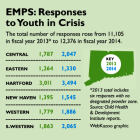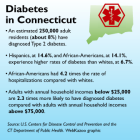Women's Health
East Meets West: Acupuncture Said To Boost Pregnancy Rates
|
For Maria Coplit, the decision to use traditional and laser acupuncture to complement her high-tech fertility treatments seemed like a “no brainer,” especially after experiencing the toll of multiple miscarriages while trying to have a second child. “We decided to empower ourselves as much as possible,” said Coplit, of Westport, who gave birth to a daughter through in vitro fertilization (IVF) at Reproductive Medicine Associates of Connecticut. “Acupuncture helped create a calming environment, even if it was just having a blissful hour to myself where I wasn’t stressing out about the world or raising a toddler at home.”
Coplit is among many women and couples who are turning to the ancient Chinese practice of acupuncture to supplement the assisted reproductive technology that helps infertile Connecticut couples to become parents. While proponents concede acupuncture alone won’t lead to pregnancy in complex fertility cases, they say it is an effective complement to traditional treatment. “More women and couples are seeking a holistic approach to fertility treatment that takes into account the mind-body connection,” said Dr. Joshua Hurwitz, a reproductive endocrinologist at Reproductive Medicine Associates, which has four offices in Fairfield County.


